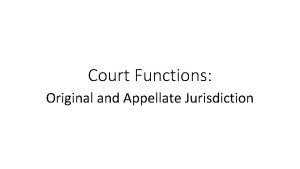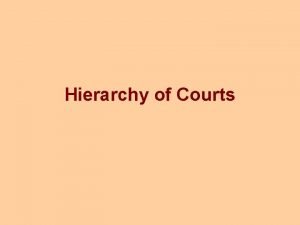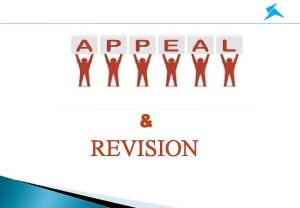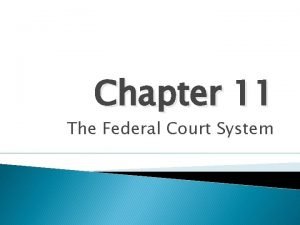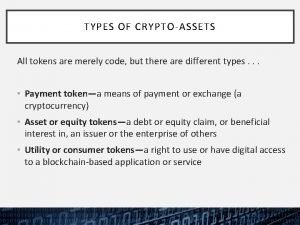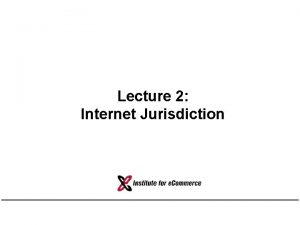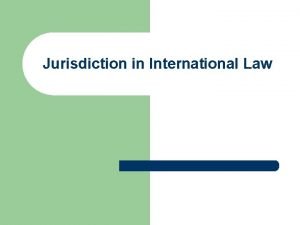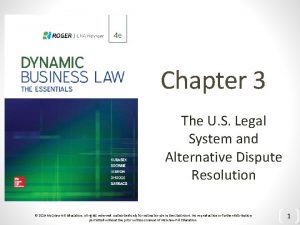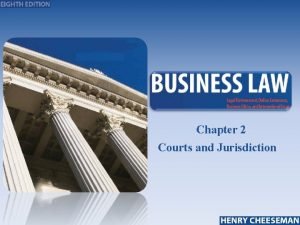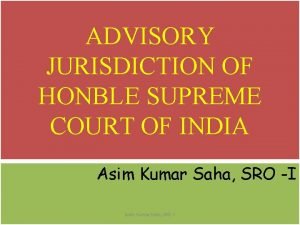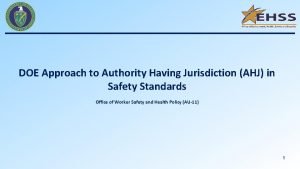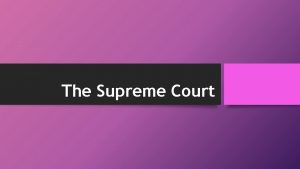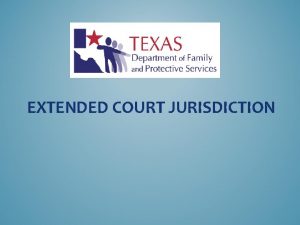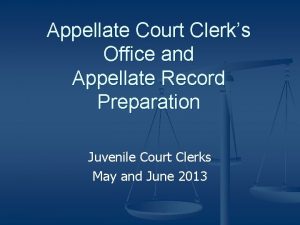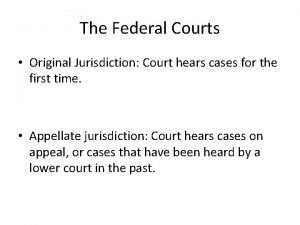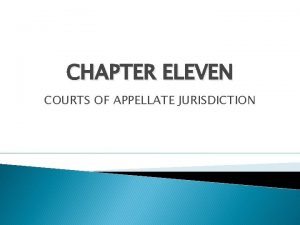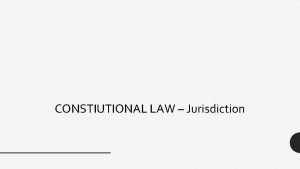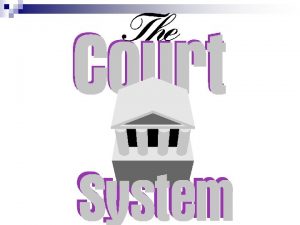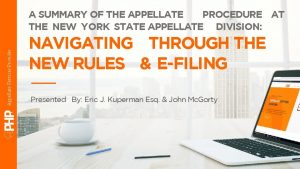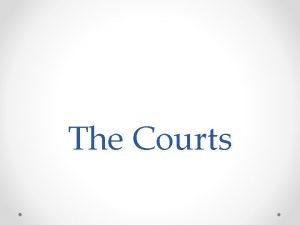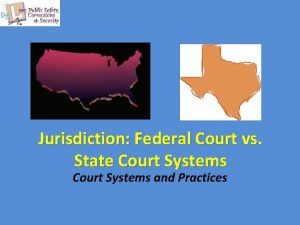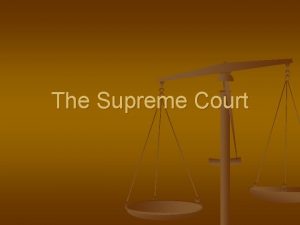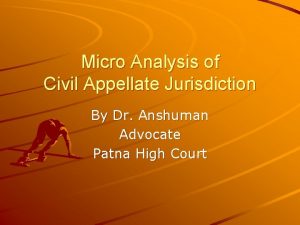Court Functions Original and Appellate Jurisdiction Courts exercise















- Slides: 15

Court Functions: Original and Appellate Jurisdiction

• Courts exercise two types of jurisdiction over cases: original jurisdiction and appellate jurisdiction for cases previously heard in a lower court. Judges have the option, when hearing an appeals case, to reverse or remand a decision based on a violation of law like abuse of discretion. • What Is the Court's Function in General? • Whether it is dealing with two neighbors squawking over an overgrown shrub or sentencing a murderer to many years in prison, a court's function is essentially to keep the peace. A court, whether municipal, state or federal, is made up of an unbiased group of judges who hear testimony, weigh evidence and rule on the outcome of a civil or criminal trial. • There are three levels of courts: municipal courts, state courts and federal courts. Each level of court exercises jurisdiction, or its authority to hear a case, based on a few factors. With attention to jurisdiction, we will study original and appellate jurisdiction in state and federal courts.

Original Jurisdiction • Keep in mind that no one state court behaves exactly as another, meaning state courts have different procedures and rules. As we learn about jurisdiction, we will focus on a general rule not specific to any one state. • Again, jurisdiction is a court's authority to hear a case. There are two types of jurisdiction: jurisdiction over property and people, and subject matter jurisdiction. • To keep things simple, jurisdiction over property is used to seize a valuable asset needed to make restitution to an injured party or to entice a defendant to appear in court. On the other hand, jurisdiction over people is decided based on whether a party to the suit lives in the forum state or the state in which the tort or criminal act took place.

• Subject matter jurisdiction is used based on the nature of the case. For instance, a murder trial will be heard in criminal court while divorce proceedings will be heard in family court (depending on the state). • Sometimes, a defendant to a case lives outside of the forum state, or state to which the case is being tried. When this happens, long-arm statute is used to bring an out-of-state defendant to trial in the forum state. • Bringing an out-of-state defendant to trial in another state is not cut and dry. Minimum contact with the forum state needs to be established. To say it a different way, to exercise jurisdiction over a defendant in a different state, the court must prove that this defendant has minimum contact in the forum state either by residence or business dealings.

• As an illustration, in International Shoe v. State of Washington (1945), International Shoe Company was a shoe manufacturer with its headquarters in Delaware and its manufacturing plant in Missouri. The state of Washington brought suit against International Shoe, a Delaware company with manufacturing done in yet another state, for unpaid employment tax for employees who resided in Washington State and worked for the company. • Even though International Shoe did not conduct official business, like having official storefronts, in Washington, the state sought to collect taxes from the company by reason of minimum contact.

• In the end, minimum contact was established based on a few factors: • International Shoe salesmen who resided in Washington made regular wages • Salesmen set up mock stores where samples could be tried and orders were taken • The company benefited from the laws of Washington • In sum, original jurisdiction can be extended over property and people as well as subject matter. Broad jurisdiction is typical of state courts. Appellate courts exercise a more limited jurisdiction over cases.

Appellate Jurisdiction • Appellate courts hear cases moved up from a lower court when one or more parties to a case is not satisfied with the lower court's ruling. Both federal and state appellate courts work in mostly the same way. Once a lower court has made a ruling, one or more of the parties may request that a higher court hear the case. • Once the disgruntled party or parties files an appeal, this higher court will hear the case only if the issue for appeal stems from an issue of the application of law or where there was a violation of one's rights under the Constitution. No new evidence can be presented nor will a new trial, per se, take place. • The judges or justices will review the ruling and rationale for the lower court judgment and make a decision to affirm, remand or reverse the ruling.

Decisions, Decisions • If a decision is affirmed, the higher court is simply confirming the decision of the lower court and no further action can be taken. A case is remanded when it is sent back to lower court for further action based on the judge's review and advice. • In Gideon v. Wainwright (1963), a young, homeless Clarence Earl Gideon was tried and convicted of a misdemeanor crime in the state of Florida. At the time, Florida held that in exception of one's Sixth Amendment right to counsel, a misdemeanor crime did not qualify.

• As a result, Gideon unsuccessfully represented himself and was found guilty of petty larceny and burglary. While serving his prison term, Gideon began studying the law and discovered that his Sixth Amendment right was, in fact, violated. • For that, Gideon filed a writ of habeas corpus, or a claim of false imprisonment, with the U. S. Superior Court on the basis of a violation of his constitutional rights. It was found that Gideon's right to counsel was violated. • Gideon's case was remanded back to lower court where he was appointed an attorney to represent his rights. He was found not guilty.

• There are times when an appellate court actually reverses the decision of a lower court ruling by annulling the judgment made in a previous trial because there was a violation of law or constitution. Specifically, in Lochner v. State of New York (1905), the state of New York restricted the number of hours a bakery employee could work to less than 60 hours a week. • Lochner, a baker out of Utica, New York, argued that the law restricted the products he could produce, thereby violating his Fourteenth Amendment to right to life, liberty or property without due process. The state of New York claimed that having workers exceed 60 hours was dangerous, and they required ample rest between shifts.

• The court reversed the decision on the grounds that limiting work hours limited free market opportunities and affected his right to freely operate a business. This landmark case helped shape future human resource law like overtime pay. • As we learned, there are several decision types in appellate court. A decision to remand can be decided because a case needs further action. Reversal of a lower court judge's decision occurs when there is a violation of law or constitution.

• There is another instance that can cause a judge or justice to remand or reverse a decision. Abuse of discretion is the failure to consider the law and facts of a case. • This is a tricky accusation to levy against a court. It requires burden of proof by the appellant. This can be done using what the court calls a reasonable person test that measures the behaviors of the accused against what a reasonable person would do. This means, if most people would see a situation the same way, it is reasonable that the accused did too. If not, then it may just be abuse of discretion.

• To clear this up a bit, let's review People of Illinois v. Meeks (2013). In March 2010, Meeks visited a local Walmart. While in the store, it was noticed that he allegedly shoplifted. A guard attempted to stop Meeks, but Meeks got away, fleeing in his car. Witnesses to the crime were able to jot down his vehicle tag, and he was located a short time later. • Meeks pleaded guilty to the crime. But he asked for a reduced sentence stating that he was the sole supporter of his family. The judge, insensitive to Meeks' motion to reduce sentencing, based his maximum sentence on Meeks' prior actions.

• Although Meeks' character witnesses painted a very positive picture, Meeks didn't always live a clean life. It seems that in the past, he had committed several other crimes for which he served time. The judge based the sentencing decision on a rule that qualified Meeks for a longer prison term because the past crimes were committed within a 10 -year period prior to the Walmart heist. • The judge also stated that his intent in his sentencing decision was to deter Meeks and others from making a mockery of the court system. He was given a maximum sentence. Meeks cried abuse of discretion to a higher court because the judge did not factor in Meeks' new lifestyle: married, educated, sole-provider of a wife and children and the many character statements received from friends and family. He merely looked at the rap sheet and a faceless felon.

• While the judge's comments and perceived bias does leave a sour after note, Meeks' argument for abuse did not fare well with the higher court. It was decided that a useful citizen does not commit crimes. Meeks' committed several crimes over a 10 -year period of time, for which he served time in either prison or through a probation program. • With this in mind, it was determined that Meeks did not learn from his past. The court decided that no abuse occurred and the ruling from the original court was affirmed.
 Types of jurisdiction
Types of jurisdiction Court jurisdiction types
Court jurisdiction types Jurisdiction of supreme court
Jurisdiction of supreme court Competition appellate tribunal
Competition appellate tribunal Quasi-judicial proceeding
Quasi-judicial proceeding Is there a basketball court above the supreme court
Is there a basketball court above the supreme court The federal court system chapter 11 answer key
The federal court system chapter 11 answer key Federal reserve jurisdiction
Federal reserve jurisdiction Ice jurisdiction
Ice jurisdiction Federal question jurisdiction
Federal question jurisdiction Three types of jurisdiction
Three types of jurisdiction Types of jurisdiction
Types of jurisdiction Jurisdiction vs venue
Jurisdiction vs venue Jurisdiction vs venue
Jurisdiction vs venue Jurisdiction cacodaemonic
Jurisdiction cacodaemonic Authorities having jurisdiction
Authorities having jurisdiction
